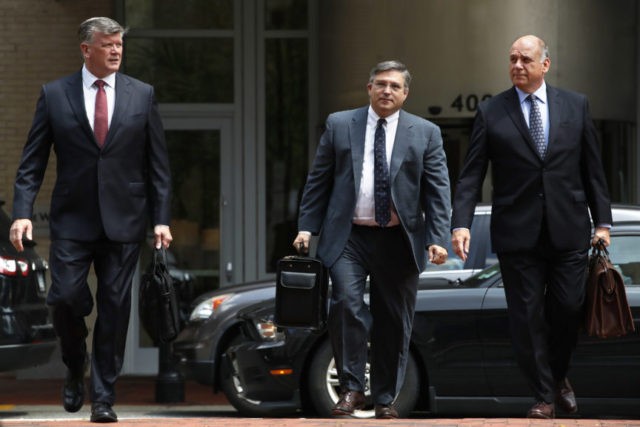ALEXANDRIA, Va. (AP) — Prosecutors rested their tax evasion and bank fraud case in the trial of former Trump campaign chairman Paul Manafort, closing two weeks of testimony that depicted him as using millions of dollars hidden in offshore accounts to fund a luxurious lifestyle — and later obtaining millions more in bank loans under false pretenses.
The trial of the longtime Washington operator turns Tuesday to Manafort’s defense team, which has so far blamed any wrongdoing on Rick Gates, the former Manafort protege who testified he and his former boss committed crimes together for years. Defense attorneys have called Gates a liar, philanderer and embezzler as they’ve sought to undermine his testimony.
Manafort’s lawyers have not yet said whether they will call any witnesses or present other evidence in the case. They will have to disclose that information Tuesday as the case reaches its final stages.
The trial is the first to emerge from special counsel Robert Mueller’s investigation, but it does not relate to any allegations of Russian election interference or possible coordination with the Trump campaign. Neither Manafort nor Gates have been charged in connection with their Trump campaign work.
Still, the proceedings have drawn President Donald Trump’s attention — and tweets — as he works to undermine the standing of the Mueller investigation in the public square.
Trump has distanced himself from Manafort, who led the campaign from May to August 2016 — with Gates at his side. Gates struck a plea deal with prosecutors and provided much of the drama of the trial so far.
The government says Manafort hid at least $16 million in income from the IRS between 2010 and 2014 by disguising money he earned advising politicians in Ukraine as loans and hiding it in foreign banks. Then, after his money in Ukraine dried up, they allege he defrauded banks by lying about his income on loan applications and concealing other financial information, such as mortgages.
Gates said he helped Manafort commit crimes in an effort to lower his tax bill and fund his lavish lifestyle. During testimony, Gates was forced to admit embezzling hundreds of thousands of dollars from Manafort and conducting an extramarital affair.
The prosecution has introduced a trove of documentary evidence as they’ve sought to prove Manafort committed 18 separate criminal counts. Along the way, they’ve not only faced an aggressive defense team but tongue-lashings from U.S. District Judge T.S. Ellis III, who presides over the case. The admittedly impatient judge has pushed the government to speed up its case.
Before the government rested its case Monday afternoon, the court heard testimony from a bank executive who said he found several red flags with Manafort’s finances while he was being considered for more than $16 million in bank loans.
James Brennan, a vice president at Federal Savings Bank, says Manafort failed to disclose mortgages on his loan application. He said he also found several “inconsistencies” in the amount of income Manafort reported for his business.
That information led senior executives to reject one of the loans. But Brennan said Federal Savings Bank chairman Stephen Calk overruled that decision.
“It closed because Mr. Calk wanted it to close,” Brennan said.
Other witnesses have said Calk pushed the loans through because he wanted a post in the Trump administration.
Emails admitted into evidence in the trial show that in the weeks after the 2016 election, Manafort lobbied Trump’s son-in-law, Jared Kushner, to consider Calk for secretary of the Army, a position Calk had put at the top of his list in an earlier email to Manafort. Calk also listed seven other senior domestic appointments and 18 ambassadorships — ranked in order of preference — that he would accept.
In the Nov. 30, 2016, email to Kushner, Manafort passed along Calk’s resume along with two other names of people he said “should be a part of the Trump administration.”
“The 3 individuals are people who I believe advance DT agenda. They will be totally reliable and responsive to the Trump White House,” Manafort wrote, providing brief biographies for Calk and the other two candidates.
Manafort noted Calk’s background was “strong in defense issues, management and finance.” He also listed three “alternative positions” in the Treasury and Commerce departments.
Kushner responded, “On it!”
Calk ultimately did not get an administration post, though he did approve the loans for Manafort.
Brennan said the Chicago-based bank lost at least $11.8 million because it had to write off the two loans, which he said were the two largest loans the bank had made at that time.
The prosecution also recalled a Treasury Department agent — over the objections of Manafort’s defense team — to testify that two of his companies hadn’t filed any reports disclosing the foreign bank accounts as required by federal law.
Senior special agent Paula Liss said the Treasury Department had no record of DMP International or Davis Manafort Partners filing such reports between 2011 and 2014.
Liss’ testimony came after Manafort’s attorneys signaled they intend to argue that the offshore accounts that he used to pay for millions of dollars in personal expenses, such as fancy suits, landscaping, rugs and homes, were actually controlled by the company and not him personally.
Late Monday, Manafort’s team also made a motion to dismiss all the charges, saying the government hadn’t met its burden of proof. Ellis took the motion under advisement.
Ellis also closed the courtroom from the public while he heard arguments on a sealed motion filed by Manafort’s team. Ellis said the proceedings and the motion will be kept secret until after the case concludes.
The closed hearing came after the judge delayed Manafort’s trial for hours last Friday without explanation. The judge left the courtroom that day toward the jury room, and later admonished jurors repeatedly to not discuss the case.
___
Online:
Emails admitted into evidence Monday: http://apne.ws/gWcMTxH

COMMENTS
Please let us know if you're having issues with commenting.